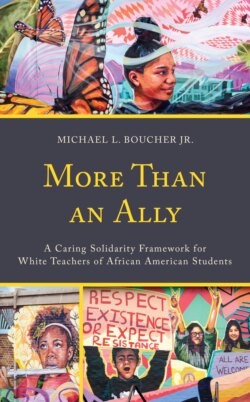Читать книгу More Than an Ally - Michael L. Boucher Jr. - Страница 6
На сайте Литреса книга снята с продажи.
Who Am I?
ОглавлениеIn order to discuss the positionality of teachers and gain the historical and personal context for how they can work in solidarity with students, it is important to have at least an outline of my personal history and positionality so that my identity and worldview can also be placed in context. Personal and family histories matter in that they have shaped and continue to have influence over us. Thus, one of the first steps to interrogating my own standpoint is to understand how I came to that position. In short, I am a mostly White male who grew up in the suburbs of Minnesota and taught in an inner-city high school in Minneapolis.
As for my family history, on my mother’s side, my ancestors came from Poland and England along with many other immigrants in the 1800s. On my father’s side, beginning in 1830, some of my ancestors were removed by the United States during the Trail of Tears from their homes and farms in what is now Mississippi and Alabama. They were placed in southern Oklahoma “Indian Territory.” By blood quantum, my grandmother was a quarter Choctaw and Irish, and my grandfather was mostly English from a poor family of farm laborers. I am a registered and voting member of the Choctaw Nation of Oklahoma.
When I was very young, my father obtained a position in Minnesota, and that is where I grew up and spent most of the first forty-five years of my life. Growing up in Minnesota, all my friends’ parents were White, middle class, and college educated. It was the stable, uncomplicated life that my parents wanted for me. Yet I felt there was a piece of me that belonged somewhere else. I was discontent identifying with the cultural norms of the Minnesota mix of Norwegians, Germans, and Swedes of my suburban upbringing. Even though we only went to Oklahoma a few times in my youth, I was always proud to be “something else” that others did not share.
I have had little contact with Choctaws in Oklahoma other than extended family, but I feel that the Choctaw Nation is an important part of who I am. In college, I began carrying my Choctaw identification card in my wallet. That ID card is a good metaphor for my connection to the tribe. It is something that I keep with me, but it is not outwardly visible.
It is my own indicator of difference from the society around me and, growing up, I felt that it gave me permission to be an outsider whenever I felt like it. However, as an adult, I came to realize that for all my imaginings of being an outsider, I was deeply rooted in the privilege afforded me by whiteness and my middle-class economic status.
Upon graduating from college with a degree in social studies education, I gained a position in the Minneapolis public schools where I began the process of becoming an urban educator. There I found the diversity I had been wanting. I was able to experience cultures, ideas, and people that taught me how to be a more complete teacher and person. I taught middle and high school social studies for eighteen years until I left to pursue my doctorate in education and became a teacher educator. For the purposes of this discussion, I position myself as a mostly White male former high school teacher, now teacher educator.
